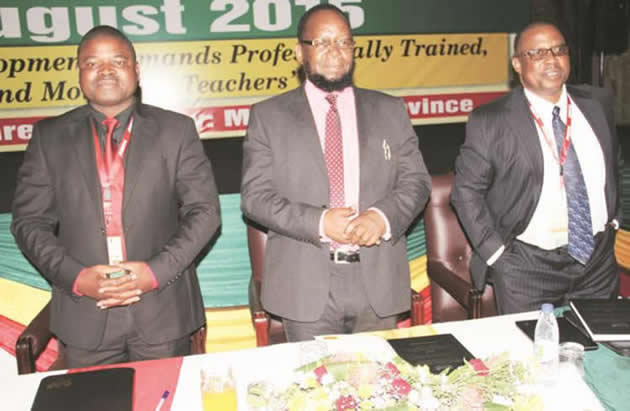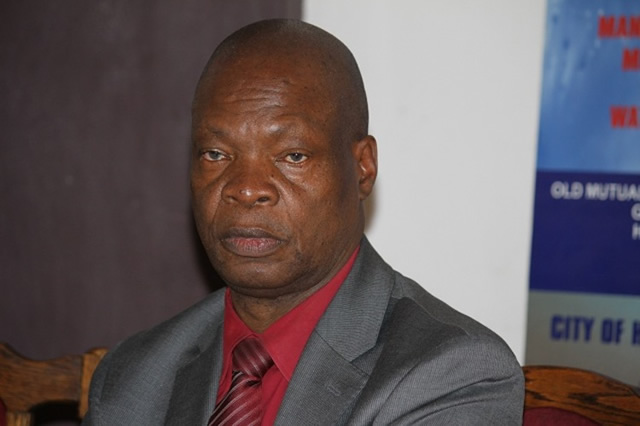Quality education starts with staffing

Abigail Mawonde Review Correspondent
President Mugabe last Saturday said that the country needs to address the quality of its education system to ensure relevance. He was addressing mourners gathered at National Heroes Acre for the interment of Dr Sikhanyiso Duke Ndlovu.
Said the President: “At Independence, we turned to educationists like Dr Ndlovu to show the way. They did, which is why today we stand as a shining beacon in broad-based, inclusive education on the continent.
“The real challenge is now to give that education a qualitative leap so it speaks directly to the needs of our economy. Yes, we have many graduates, but we have few skilled graduates, who have found exposure and gathered experience in the service of industrial trades that power our economy. That is our challenge as we move into the future.”
One of the challenges in the education sector has been that of staffing. Whatever syllabus of education system as may be deemed the best for the country, it needs staff that is correctly oriented to cater for its goals and targets. The question of quality in teacher education and practices is an argument for another day.
Meanwhile, the ministry seems to be facing the challenge of adequately staffing schools. Earlier in the year the Primary and Secondary Education Ministry revealed that there are almost 22 000 unqualified teachers in the system.
“A total of 10 341 are unqualified to teach at primary level, while secondary schools account for 11 519. Matabeleland North province, at primary level, has the highest number of unqualified teachers, recording 1 953 against a total of 4 793 followed by Mashonaland Central with 1 853 unqualified teachers against 4 579 qualified teachers followed by Mashonaland West and Midlands respectively. Masvingo province recorded the highest number of qualified teachers with 9 994 of its teaching staff having teaching diplomas and degrees and has only 491 unqualified teachers,” the ministry said in a statement.
The ministry staffing has since then come under the spotlight after results of the Civil Service audit revealed that there are major anomalies in the staffing structures of a number of schools.
The audit revealed that School Development Associations in 3 412 schools countrywide recruited a combined 6 379 primary and 534 secondary school teachers. In addition the Government is also paying 2 888 teachers who are employed by private institutions.
The audit also revealed that there are 32 schools with two heads each and 63 schools with two deputies each. 170 secondary schools with enrolments of less 600 pupils and therefore ineligible for substantive deputy head positions have also seen it fit to appoint substantive deputies. This administrative negligence is costing the Government $1 2 445 120 each year in remuneration bills for staff who are in positions that they should not be occupying.
Reports emanating from Bulawayo say that the Civil Service Commission has reportedly transferred dozens of teachers from Bulawayo to rural areas after an audit revealed that most schools in the city were overstaffed as a number of teachers had fewer teaching periods.
According to the Government’s Authorised Teacher Establishment, teacher to pupil ratio is pegged at 1:33 for Forms One and Two, 1: 30 for Forms Three and Four and 1:20 for Lower and Upper Sixth forms.
Teachers are supposed to have 32 periods per week, senior teachers 24 and heads of departments 28. Headmasters are also expected to teach five periods per week while their deputies teach 12 periods.
But it is understood that during the audit by the commission carried out in August, which was seeking to unearth ghost workers in the public service, it was discovered that a number of schools mostly in urban centres were “overstaffed” with a majority of teachers especially seniors not conducting the required minimum lessons.
While some seniors had given themselves fewer periods, it has since come to the attention of authorities that there are teachers who are “overloaded” with some having as many as 36 periods per week.
Although officials in the commission and education in Bulawayo were reluctant to divulge information on the number of affected teachers, Dr Lazarus Dokora confirmed the exercise but said he did not have details of the effected teachers at hand.
“The transfers are being done by the Civil Service Commission. They are the ones who have been seized with the matter,” said Dr Dokora. Investigations revealed that at Msiteli High School in Mpopoma, Bulawayo, eight teachers were this term transferred through the exercise. Some of the teachers that were affected by the exercise at Msiteli were found to have been wrongly deployed as some of them were trained to teach at primary school. Teachers at other schools both at secondary and primary also confirmed that they have been apprised of the exercise.
“We were told the commission is in the process of transferring teachers deemed excess at schools so we have been told to prepare to receive letters,” said a teacher at a local school who could not be named for professional reasons.
Efforts to establish whether the justification of teacher-pupil ratios have affected any other province were unsuccessful. However, teacher unions say that the exercise will bring more problems than solutions.
Teachers Union Of Zimbabwe CEO Mr Manuel Nyawo said there is need for wide consultation to avoid effecting changes based on erroneous intelligence.
“We wonder whether all of a sudden our schools have become overstaffed by teachers from where, when we have been running a shortage even since independence.
“We do not think it is true that, because what they are saying suggests that we have excess teachers in the country yet the truth is that we are running a shortage of plus or minus 13 000 thereabout, so we do not know now who is going to replace. Are we saying the schools are overstaffed to warrant these transfers to the rural areas?”
ZIMTA president Mr Richard Gundane concurred: “We have heard that story and we have deployed our people on the ground to see what is really happening and we have actually started engaging the Commission to say I think the Public Service Commission is getting too excited and we want to believe that this is an unnecessary victimisation of teachers because I do not believe that the Public Service Commission is competent enough to be able to go to a school and say the school is overstaffed.
“There are certain logistical inputs that I am confident they are not even conversant with, to say, how big is a big class? There is no school that is overstaffed. We have pupils who go to as much as 75 per class when in actual fact we should not be having more than 42 students in these secondary schools.”
Mr Nyawo said the commission has not communicated well with stakeholders.
“The Public Service Commission is fuelling up a lot of confusion, the Commission seems to have taken over the duty of recruiting teachers ahead of the current ministry which should be recruiting its own personnel or officers
“We are verifying with the Minister on the audit that was carried out by the Public Service Commission. They said they are still in the process of verifying the audit report to establish if it is indeed true that the education sector is overstaffed by the so called ghost employees.”
He, however, said their members do not seem to be affected as of now’
“We have, however, not received complaints but if anything is going to go by we do not think Government will be doing justice to teachers who would have worked for more than 20 years in the same constituency only to be changed to rural areas,” said Mr Nyawo.
Mr Gundani said his association has advised affected staff members not to heed the directive to move stations.
“So as far as we are concerned we have encouraged the affected teachers to stay put and not to be moved because they were not deployed to those schools by the Commission in the first place.”
It is to be hoped that the Government through the relevant ministry can solve this basic problem then move on to more complex ones such as an overhaul of syllabus as implied by the President.
Extra reporting from The Sunday News








Comments